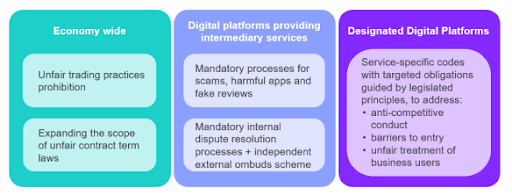In a bold move, that we believe is much needed, the Australian Government alongside the Australian Competition and Consumer Commission (ACCC) has proposed sweeping changes to Australia’s competition law reforms. These reforms are aimed at reining in the seemingly unchecked powers of some of the major digital platforms and helping to level the playing field for consumers and small businesses.
Let’s explore some of the changes that might impact you!
In This Article – Levelling the Digital Playing Field: How Australia’s Proposed Competition Law Reforms Could Benefit You
- Background
- The issues
- Proposed competition law reforms
- Benefits to consumers
- Benefits to small businesses
- Where to from here?
Levelling the Digital Playing Field: How Australia’s Proposed Competition Law Reforms Could Benefit You
Background
In recent years, we’ve seen a meteoric rise of digital platforms. You’re reading this article on one right now. And if you have a business, it’s highly likely you have your own digital platform.
The Government’s and ACCC’s concerns have really arisen out of the rapid expansion of the five biggest digital platforms in Australia (and in the world). These are Amazon, Apple, Google, Meta and Microsoft.
These digital platforms are expanding into everyone’s homes, daily lives and livelihoods. And because of that, there is an increasing risk of harm to competition and, therefore, to Australian businesses and consumers.
The ACCC reports, ‘The continued expansion of digital platforms has also increased the risk of those platforms engaging in harmful behaviour, such as invasive data collection practices and consumer lock-in practices that can reduce choice and stifle innovation. Robust competition is critical for markets to function well. As the digital economy evolves and the ecosystems of digital platforms continue to expand, we must be equipped with the appropriate regulatory tools to ensure effective competition in these markets.’
It is these concerns that have prompted the review of Australia’s competition laws, and the legislative response needed.
The issues
During their review process, the ACCC noted some core issues that needed addressing. These include:
- Self-preferencing – Self-preferencing is when a digital platform – for example, Google – gives preferential treatment to its own products or services over those of their competitors. For example, Google might rank its own software tools above those of another search engine, even when they aren’t the best option for the searcher.
- Exclusive dealing – A digital platform that requires a user to buy from them exclusively, in exchange for more favourable terms, is considered exclusive dealing. An example of this might be an app developer platform requiring users to use its payment system for a better price.
- The use of data to entrench market power – The largest digital platforms have access to huge amounts of data – more than most other platforms could even imagine. By leveraging this data, they can make improvements or offer new services and outcompete everyone else.
These actions stifle competition and limit consumer choice. They can also create barriers for entry and growth for other companies and platforms, which further entrenches their own market power.
The proposed competition law reforms
The proposed reforms will ultimately come from recommendations set out in the ACCC’s fifth Digital Platforms Services Inquiry report. The Government has agreed in principle to a range of recommendations that will address the harms to Australian consumers but will be subject to more analysis and examination before being introduced into a legislative format.
But we have a good idea about what to expect. These competition legislation reforms are expected to introduce mandatory codes of conduct for certain digital platforms. These ‘designated’ digital platforms would be determined by criteria that utilises predetermined metrics, such as the number of active users. The goal is to ensure that the platforms covered by the reforms are the right platforms, and to limit the impact of the legislation to what is proportional to that platform.
The reforms we can expect to see will be around the following:

source: ACCC Digital platform services inquiry
Benefits to consumers
The competition law reforms will bring some real benefits to consumers and end users. The Government is addressing anti-competitive practices, which means there will be a more level digital marketplace. And this could lead to lower prices, improved service and space for greater innovation and creativity.
There will also be more transparency in how digital platforms operate. And that means that consumers (you and me) will have more control over their online choices.
Benefits to small businesses
Changes to Australia’s antitrust laws will also be a huge benefit to small businesses. They’ll level the playing field so that small businesses with a smaller digital presence can have more visibility and better reach new markets and new customers. This can only mean increased ability to grow and thrive in our new digital reality!
Where to from here?
These proposed competition law reforms mark a pivotal moment in Australian history. And they also represent the next step forward to ensuring that the digital economy works for everyone.
The domination by large players isn’t good for anyone, except the large players themselves. And these new reforms will create a more competitive, transparent and fair digital marketplace.
At Victor Legal our team is closely monitoring these developments. We’ll keep you up to date with the changes as they come. And if you need any insights and guidance on how to succeed in the digital economy, get in touch. Our team is here to help!
